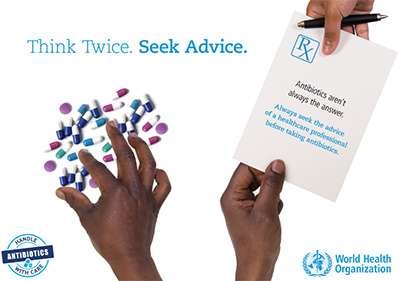 November 2017 – World Antibiotics Awareness Week will be observed from 13 to 19 November 2017, with the year of this year’s campaign “Seek advice from a qualified health care professional before taking antibiotics”. The aim is to advocate for the proper and responsible use of antibiotics to prevent their misuse.
November 2017 – World Antibiotics Awareness Week will be observed from 13 to 19 November 2017, with the year of this year’s campaign “Seek advice from a qualified health care professional before taking antibiotics”. The aim is to advocate for the proper and responsible use of antibiotics to prevent their misuse.
It is important to seek the correct medical advice before taking antibiotics, not only to ensure that you receive the appropriate treatment, but because responsible use of antibiotics will also help reduce the growing threat of antimicrobial resistance. Antimicrobial resistance is the ability of a microorganism (like bacteria, viruses, and some parasites) to stop an antimicrobial (such as antibiotics, antivirals and antimalarial) from working against it. As a result, standard treatments become ineffective, infections persist and may spread to others.
The use and misuse of antibiotics has increased the number and types of resistant organisms. Consequently, many infectious diseases may one day become untreatable. This situation has grave consequences for both health and the economy. Every year in the Region, around 750 000 people die as a result of infections that cannot be treated with antibiotics. This number is expected to dramatically increase in the coming years.
Antimicrobial resistance poses a huge threat to global health ‒ both to human and animal health ‒ especially as studies indicate that few new antibiotics are being developed to combat the growing threat of antimicrobial resistance. Most of the drugs currently being developed are modifications of existing classes of antibiotics and represent only short-term solutions.
Very few potential treatment options exist for those antibiotic-resistant infections identified by WHO as posing the greatest threat to health, including drug-resistant tuberculosis which kills around 250 000 people each year. In addition to multidrug-resistant tuberculosis, WHO has identified 12 classes of priority pathogens – some of which cause common infections, such as pneumonia or urinary tract infections, that are increasingly resistant to existing antibiotics and in order to treat require the development of new drugs.
New treatments alone, however, are not sufficient to combat the threat of antimicrobial resistance. Other measures are needed such as improved infection prevention and control, an area in which WHO provides support to countries and partners to foster appropriate use of existing and future antibiotics.
The WHO Regional Office for the Eastern Mediterranean will launch the week in an event to be held on 13 November at the WHO premises in Cairo.
In recognition of the burden of antimicrobial resistance in the Region, Member States recently endorsed resolution EM/RC64/R.5 at the Sixty-fourth Session of the Regional Committee for the Eastern Mediterranean in Islamabad, Pakistan, in October 2017. WHO’s Eastern Mediterranean Region is the first WHO region to endorse a resolution to address the problem of antimicrobial resistance recognizing the serious health and economic consequences not only for the Region but globally.
For this year’s World Antibiotics Awareness Week, WHO calls on every one ‒ governments, communities, health care professionals, individuals and farmers ‒ to handle antibiotics with care and for individuals to only take antibiotics if prescribed by a doctor.



